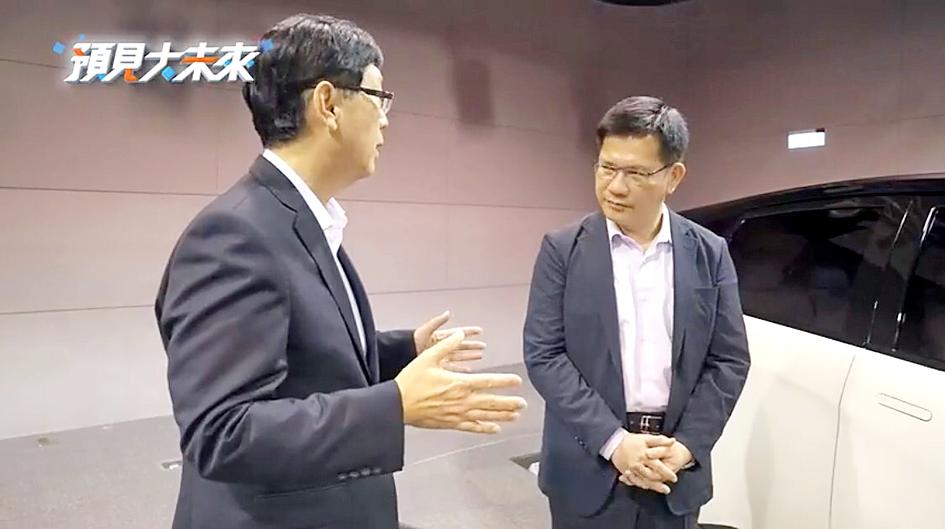Taiwan would manufacture about 90 percent of components used in the power systems of locally made electric vehicles by 2024, as the nation intensifies its efforts to penetrate the global electric vehicle (EV) market, Hon Hai Precision Industry Co (鴻海精密) said on Tuesday.
In a video released by Hon Hai, company chairman Young Liu (劉揚偉) told former minister of transportation and communications Lin Chia-lung (林佳龍) that he expects the local manufacturing sector to make about 90 percent of parts used by batteries, electric devices and power control solutions for Taiwanese-made EVs by the end of 2024.
It is unlikely that a shortage of raw materials for vehicle production worldwide would improve any time soon, so automakers should reconsider their development strategies to enhance efficiency, Liu said, adding that a high rate of self-sufficiency is one of the answers to persistent shortages.

Photo courtesy of the Dadushan Industrial Innovation Foundation
Hon Hai has invested in the development of solid-state batteries and lithium iron phosphate batteries for EVs, with the goal of rolling out a sample solid-state battery and starting commercial production by 2024.
In addition, Hon Hai and Taiwanese electric scooter maker Gogoro Inc (睿能創意) have set their sights on the development of a global exchange system for EV batteries.
Hon Hai has also started to produce smart cockpits for EVs by working with multinational auto manufacturer Stellantis NV through a joint investment of US$80 million.
Meanwhile, Foxtron Vehicle Technologies Co (鴻華先進), a joint venture between Hon Hai and Taiwanese automaker Yulon Motor Co (裕隆汽車), is pushing for EV development on the MIH Open Platform.
The platform provides about 50 percent of key EV components to its members and is seeking to raise that to more than 80 percent, with Hon Hai viewing it as the “Android of the EV industry,” Liu said.
To enhance the competitiveness of Taiwan’s EV industry, Liu said local manufacturers need to focus on semiconductor and software development.
Hon Hai on Wednesday said that it would integrate its third-generation semiconductor efforts with advanced silicon photonics technology for EV applications as well as robotics use.
Third-generation semiconductors are products such as silicon carbide and gallium nitride for EV use.
The firm would focus more on mobile robotics gadgets and aims to provide tailor-made robots through its, development platform, it said.

SEEKING CLARITY: Washington should not adopt measures that create uncertainties for ‘existing semiconductor investments,’ TSMC said referring to its US$165 billion in the US Taiwan Semiconductor Manufacturing Co (TSMC, 台積電) told the US that any future tariffs on Taiwanese semiconductors could reduce demand for chips and derail its pledge to increase its investment in Arizona. “New import restrictions could jeopardize current US leadership in the competitive technology industry and create uncertainties for many committed semiconductor capital projects in the US, including TSMC Arizona’s significant investment plan in Phoenix,” the chipmaker wrote in a letter to the US Department of Commerce. TSMC issued the warning in response to a solicitation for comments by the department on a possible tariff on semiconductor imports by US President Donald Trump’s

The government has launched a three-pronged strategy to attract local and international talent, aiming to position Taiwan as a new global hub following Nvidia Corp’s announcement that it has chosen Taipei as the site of its Taiwan headquarters. Nvidia cofounder and CEO Jensen Huang (黃仁勳) on Monday last week announced during his keynote speech at the Computex trade show in Taipei that the Nvidia Constellation, the company’s planned Taiwan headquarters, would be located in the Beitou-Shilin Technology Park (北投士林科技園區) in Taipei. Huang’s decision to establish a base in Taiwan is “primarily due to Taiwan’s talent pool and its strength in the semiconductor

An earnings report from semiconductor giant and artificial intelligence (AI) bellwether Nvidia Corp takes center stage for Wall Street this week, as stocks hit a speed bump of worries over US federal deficits driving up Treasury yields. US equities pulled back last week after a torrid rally, as investors turned their attention to tax and spending legislation poised to swell the US government’s US$36 trillion in debt. Long-dated US Treasury yields rose amid the fiscal worries, with the 30-year yield topping 5 percent and hitting its highest level since late 2023. Stocks were dealt another blow on Friday when US President Donald

UNCERTAINTY: Investors remain worried that trade negotiations with Washington could go poorly, given Trump’s inconsistency on tariffs in his second term, experts said The consumer confidence index this month fell for a ninth consecutive month to its lowest level in 13 months, as global trade uncertainties and tariff risks cloud Taiwan’s economic outlook, a survey released yesterday by National Central University found. The biggest decline came from the timing for stock investments, which plunged 11.82 points to 26.82, underscoring bleak investor confidence, it said. “Although the TAIEX reclaimed the 21,000-point mark after the US and China agreed to bury the hatchet for 90 days, investors remain worried that the situation would turn sour later,” said Dachrahn Wu (吳大任), director of the university’s Research Center for